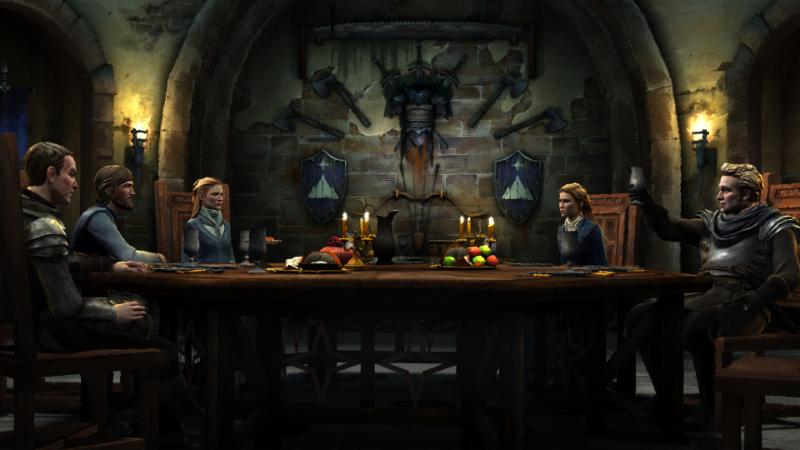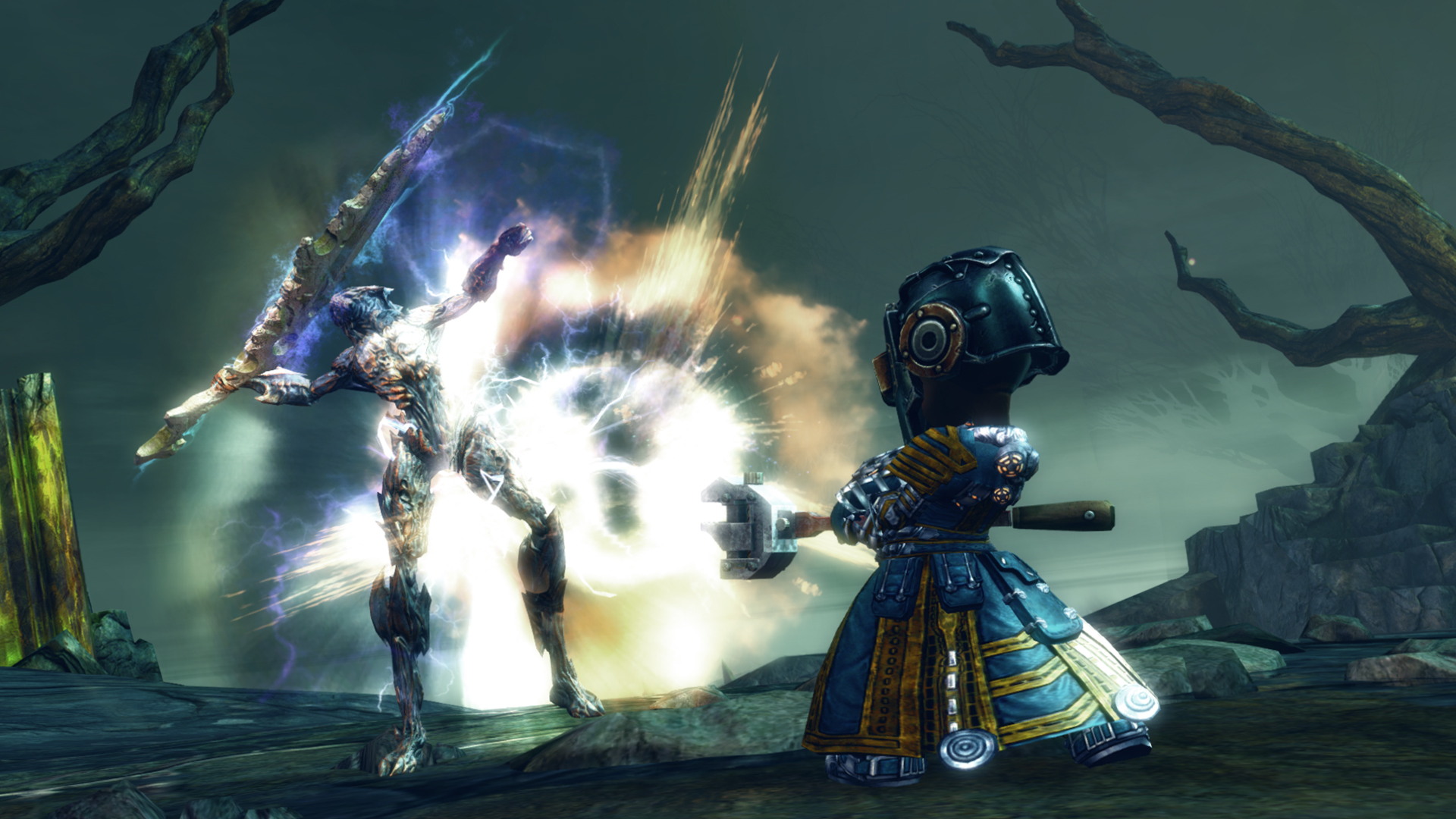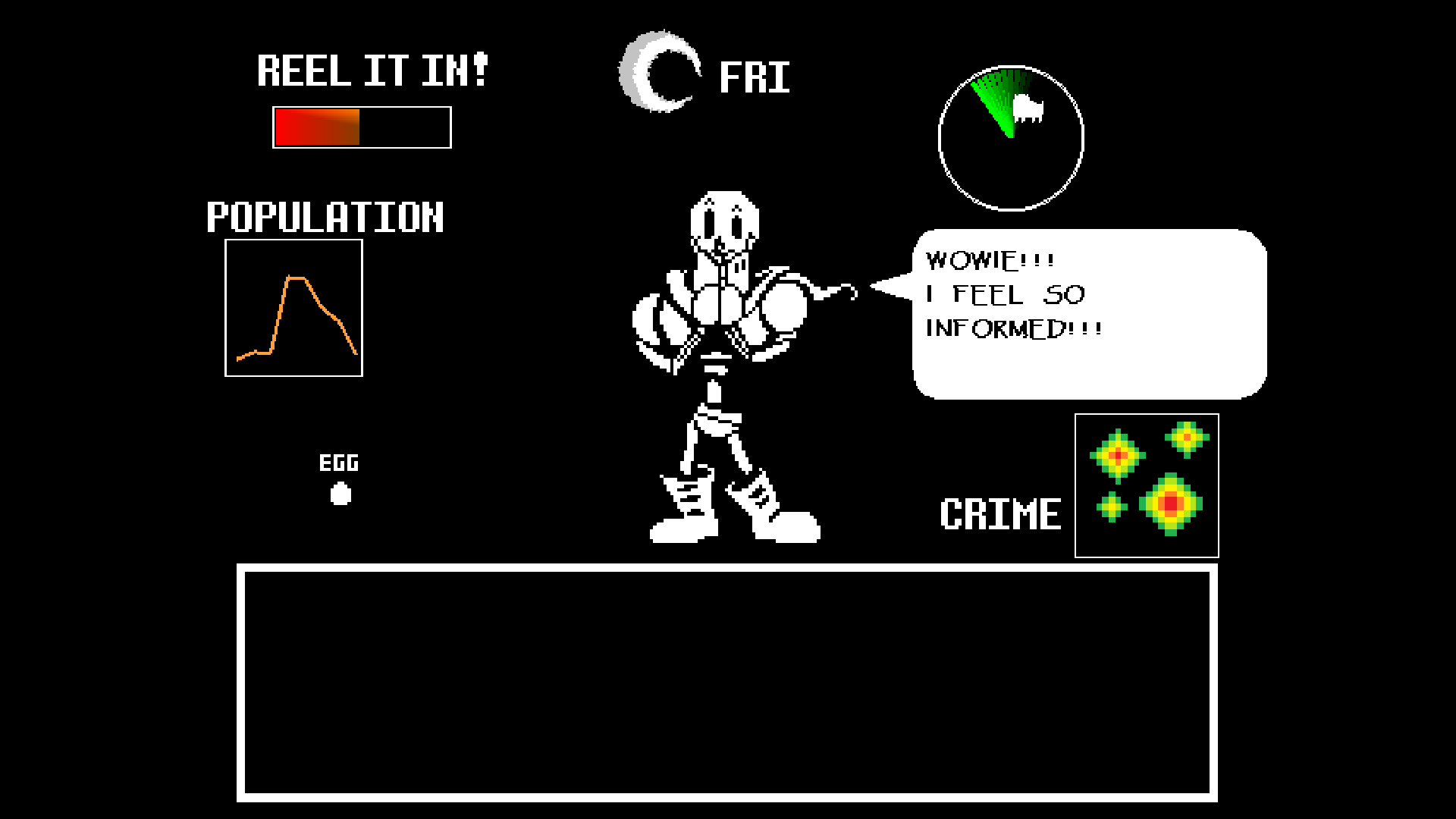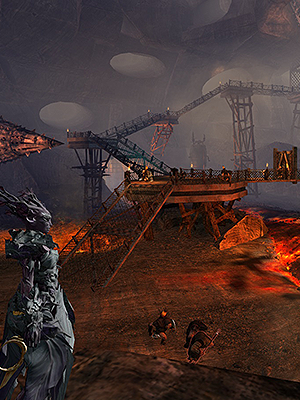
Welcome back to our ongoing exploration of Rachel Kowert and Thorsten Quandt’s book The Video Game Debate. As you can guess, the book itself focuses on games in general, not just MMOs and online games, so I was able to apply today’s chapter on moral panic to recent trending indie RPG Undertale. I’ve argued to educators that not only is there evidence that games can positively affect morals, but that part of Undertale’s charm is that we know we can do bad things yet are emotionally rewarded for acting in a peaceful manner. In fact, the game actively discourages you from committing violence by constantly trying to include you with its cast of characters.
Then someone on Reddit stepped into a conversation and asked, “What about all the griefing in sandbox games”? It’s a great question, and one addressed in this chapter.

Game history of violence… and stories
Before we get into morality, we need to talk about games, violence, and their history. James D. Ivory leads the book with a great intro to the history of games, noting that, as our commenter above already knew, games in general, starting with sports, have been a kind of simulation or replacement for combat, which is basically how animals treat play. However, we’ve evolved a bit from that, and video games have followed a sort of convergent evolution. They’re not all the same!
On the one hand, we have action games that are simulations: virtual recreations of something done in real life, like sports. On the other hand, MUDs (which led to RPGs) were originally text-only player stories that were open-ended, not graphical, developer-created stories with definitive endings. The fact that MUDs were originally online-only (as opposed to offline, single-player experiences) helps more clearly show the difference between the two categories that have more recently merged.
For MMORPG players, this push toward more action-based toolsets (rather than player-created story or developer-created but player-centered story development) may be a reason the genre has opened up, even if it feels to us as if it’s abandoning the features that drew many of us to it. This is a shame since the communicative aspect of games has so much power (we’ll cover that in future articles).
To note though, there is another evolutionary path that Ivory doesn’t cover: puzzle- and quiz-based games. This is kind of a shame since, let’s be honest, this genre’s the one a lot of mobile gamers are first exposed to. Heck, Tetris was the first game I remember my own mother actively wanting to play. However, most studies seem to show that these kinds of games have the fewest benefits, although research on them is fairly limited. That’s really interesting since I know a lot of classrooms use non-virtual quiz type games for “education,” so you might think there’d be more interest in the virtual versions. I suspect this is one of the reasons “core” gamers usually flock to RPGs and action games instead of something that, well, seems like school. Unfortunately, these are also the genres that cause the greatest amount of moral panic.

With great new technology comes great mistrust
The book’s second chapter on moral panic by Nicholas D. Bowman is probably the definitive summary of why people shouldn’t immediately fear new tech as well as a reminder that current trusted advancements were once mistrusted. I knew that novels were once considered a challenge to moral decency, but never imagined that people had thought crossword puzzles were dangerous wastes of time! The best part of the chapter, however, is that Bowman allows non-gaming critics a point: Games can potentially lead to desensitization towards violence. It’s one of the aspects of this book in general that makes it so compelling.
However, I think the reason Bowman allows this is because the way violence is presented in games changes the way we interact with it. Think about killing monsters in most MMOs. There’s almost no reason not to do it. It’s why leveling up as a pacifist is crazy. Enemy characters are seen as the best source for loot, experience, and gold. There’s no reasoning behind mindless slaughter in many MMOs, but when a game calls attention to the fact that you’ve done something heinous, then you can learn something. It’s basic education theory: Unless the problem presented by a lesson is obvious or “salient,” there’s a risk that the lesson may be missed or ignored.

Single-player vs. massively multiplayer violence
I’ve mentioned Undertale already, and most people know the Mass Effect series, but TellTale’s Game of Thrones has a moment that’s particularly memorable as a potential torture scene for me. It’s hard to watch the full version, but players are prepped for this moment in the game. The character they can torture is particularly disgusting and even taunts us when we’ve clearly bested him, but true to the IP, the characters have an intricate web of loyalties, making for potentially dire consequences for our actions as the player. Even if you forget those consequences, other characters will audibly plead for you to stop the torture, which made my actions feel particularly dirty when my emotions were running high.
Now compare that to what we experience in MMOs. Some people had strong reactions to a certain World of Warcraft torture quest — specifically Richard Bartle. Star Wars: The Old Republic had a few scenes that made me slightly question the writing and what I was being asked and allowed to do as well. But none of these interactions is particularly memorable. Modern MMOs limit story based choices, partially since themeparks in general tend to focus more on action content than player interaction, putting story in the background. This is why the “violence” we meet in games is player driven and much more complicated.

Why griefers (may) enjoy griefing
Bowman, along with Hunter L. Paul and Jaime Banks, defined griefing in one study as intentionally disrupting another player’s game experience for their own enjoyment or gain (which is the definition used in their experiment). However, some have defined griefing as the enjoyment of causing another player to enjoy their game experience less.
This is why it’s important to note the four areas of griefing: harassment (causing emotional distress), power imposition (dominating players or exploiting to harass other players), scamming, and greed play (stealing items or achievements, though I think breaking social norms to benefit oneself would fit here too).
Now, griefing has been compared to cyberbullying, but there’s a line to cross: Griefing is game related only, while cyberbullying crosses over into the real world. This is perhaps why, as a self-identified PvP fan and light “griefer,” I’ve always been uncomfortable in PvP games where people join groups with the intention of spying and betraying communities. Taking items sucks, but finding out someone you invested in as a friend was only interested in blowing up your pixels can really mess with your sense of trust.
Motivation for griefing includes superiority of knowledge (such as exploiting), harrassment, and also revenge. However, “revenge griefing” was seen by the researchers (and I think many readers) not so much as griefing but as simply a reaction to griefing. The final potential cause is that the griefer views the game as a game. That is, the person isn’t intentionally causing harm but following his or her own assumed moral beliefs about the activity and what’s acceptable.

Testing enjoyment values with SDT
Self Determination Theory (SDT) considers psychological well-being and can be used to look at factors that lead people to enjoy things, mostly through autonomy (doing what you want), competence (how good you are at being successful), and relatedness (connecting with others). The more a task appeals to these values, the more enjoyable it is. While single-player games are good at achieving the first two, online games are inherently better-equipped for the third. However, griefers seem to defy this logic because their behavior is seen as disrupting their chances at connecting with others. So what’s going on?
One idea is that acting in abnormal ways as a group, rather than as in individual, and doing so in an environment where it feels acceptable, can lead to a feeling of relatedness. This is why, despite the moniker, griefers may not feel as if they’re doing something wrong. In fact, when people outside their group seek to punish them, the challenge to the griefing group’s collective identity leads them to rebel even more. Obviously, most people see griefers as abnormal, and treating the griefers as outsiders further connects them to each other (even if the connection is simply imagined).
On the other hand, griefers may also be seeking higher levels of autonomy and/or competence than relatedness, so they may disregard social norms more than one would expect and not mind that they’ve created a barrier to connecting to the larger community. That is, they care more about being effective griefers than making social bonds.
In order to help determine griefers’ motivation for their actions, Bowman and two other researchers in a soon-to-be-published study asked current and former WoW players to either recall a time they griefed or a time they did a community event, then to reflect on their feelings and thoughts. Gamers who were more community-minded enjoyed the game when all three values felt fulfilled, particularly autonomy. “Griefers” were similar, except that griefing did not become significantly more enjoyable in terms of relatedness, though like the community gamers, the griefers highly valued autonomy — that is, they recalled enjoying acts of griefing without associating it with socializing. In fact, the biggest difference between the two groups was that griefers needed a bigger sense of autonomy, while community-minded players needed to feel relatedness more, though oddly enough, neither group showed a strong need to form social bonds.
Griefing-initiating players in particular valued autonomy and competence more than other groups, though all groups showed similar enjoyment levels of their chosen activity. However, almost half of the griefers’ reported responses involved social play, and half were retaliatory griefing. About 13% of the griefers enjoyed harassment, but about 61% simply enjoyed imposing their power. This is significant because it challenges even other studies that attempt to describe griefers as lone wolves who enjoy making the game less fun for other players. The sample was rather small though, so naturally, future studies with larger groups would be useful.
Perspective’s role in morality and griefing
Why is the difference between single-player and multiplayer violence important? Because both situations require you to notice you’re doing something immoral, but games do this in different ways. While discussing another study with Sven Joeckel and Leyla Dogruel, Bowman notes that our moral behavior is basically a gut instinct. Players play for fun as their ultimate goal, and unless something can make their experience potentially “unfun,” they’ll continue to use all available gameplay options in any context that may potentially reward them. Bowman and company tested this idea with multiple groups in a modified version of the old Neverwinter Nights and proved that, in game, people followed their morals, but only when those morals were relevant. Again, the moral choice is there either way; it just needs to be felt. It’s not “moral vs. immoral” but “moral vs. amoral.” This means that games can be used to at least reinforce known morals when they’re obvious.
For example, if someone doesn’t think that respecting authority is a moral issue, she’ll interact with “moral” issues in-game as simple game mechanics, choosing whichever path she thinks will be the most fun. This is why killing NPCs in one game is “just playing,” but in another game, like TellTale’s GoT or Undertale where there are consequences, context, or techniques that highlight your actions, it seems like an active choice.
However, more importantly, this is why a “griefer” who views PvP as a game mechanic and not a social affair doesn’t see his action as wrong, and why “revenge griefing” won’t teach him anything. I can say this because, well, this is me. When FFA PvP server rules clearly state the purpose of that server, I feel I am acting in a normal way, much like roleplayers assume that roleplaying is an acceptable norm on an RP server. Although non-PvPers and non-RPers can join these servers, it’s assumed that they understand that not partaking in the server’s intended activity makes them a minority.
In another study by Matthew Grizzard, Ron Tamborini, Robert J. Lewis, Lu Wang, and Sujay Prabhu, players were randomly selected to play a multiplayer game in which they were either UN soldiers or terrorists. The game gave players specific details about their mission and characters’ motives. After that, they were randomly assigned to write about guilty feelings associated either with the gameplay or with their normal day (the latter being the control group). As in the previous study, the findings increased the more the player noticed that a moral situation was being investigated, but the specific findings had to deal with guilt. That is, even when players committed negative actions, they felt remorse. The fact that they were more aware of the issues than the control group showed an increase in sensitivity to the issue, meaning that, at least in the short term, the game was teaching remorse.
This is again why TellTale’s GoT and Undertale make good anecdotal evidence of a trend we feel we “know” but didn’t until recently have data to support. What would be great would be a study that combines these two findings, to see if repeatedly doing these actions increases the players’ willingness to make immoral choices or drives them to further avoid them. MMOs would be the perfect place to do this.

The takeaway
Games, like other technology, were once feared, and this will fade. Great. Let’s move on, right? Wrong. Not only are games “normal,” but there are hints at using them to at least regulate morality, if not teach it.
Think of the revenge griefing situation, particularly in WoW. Unlike players in free-for-all PvP games, a WoW player has to jump through several hoops in order to talk to the ganker/gankee. As someone who’s been on both sides of the fence, I can tell you that communicating with the other person can help the other person remember that you’re a fellow player, not a mob, even when the game’s systems (like full looting) rewards players for killing you. In fact, I’ve rationally talked my way out of fights in hardcore PvP games like Darkfall by stating my case or even trying to boost the griefer’s ego, leading him to teach me tricks on defending myself and or giving me new gear. Some even became friends who watched out for me! I’ve done the same, but only in situations where the gankee specifically told me he didn’t want to “play” or was having a rough day. The game allows that interaction, but it’s not common, either as a feature or a reaction from fellow players.
This is why Worlds Adrift seems promising to me. Without NPCs, the game loses some of its “gameness.” Although it has open-world PvP, the fact that there will be only one server per region hints at the old school idea that players will need to form social bonds to at least participate in the server’s economy or risk becoming lost and/or irrelevant in swarms of alliances, a strong point that I felt made Darkfall one of the more enjoyable semi-recent FFA PvP games.
Try taking a page from Undertale. Next time you’re dealing with a griefer, maybe try using your words. Violence isn’t always the answer!
Grizzard, M., Tamborini, R., Lewis, R.J., Wang, L., Prabhu, S. Being bad in a video game can make us morally sensitive. CyberPsychol Behav. 2014; 17(8): 499–504.
Joeckel, S., Bowman, N. D., & Dogruel, L. (2012). Gut or game: The influence of moral intuitions on decisions in virtual environments. Media Psychology, 15(4), 460-485.
Paul, H., Bowman, N. D., Banks, J. D. (in press). The enjoyment of griefing in online games. Manuscript forthcoming in Journal of Gaming and Virtual Worlds.
Image attribution: Alan Levine
The Video Game Debate: Unravelling the Physical, Social, and Psychological Effects of Video Games by Drs. Rachel Kowert and Thorsten Quandt is available on Amazon. We’d like to thank Dr. Kowert for providing us with a preprint for this series. Don’t forget to catch up on all of our articles about the book, and stay tuned for more examinations of the chapters most relevant to our MMORPG audience:
 Exploring ‘The Video Game Debate’: Modern online game research
Exploring ‘The Video Game Debate’: Modern online game research
 Exploring ‘The Video Game Debate’: Online games and internet addiction
Exploring ‘The Video Game Debate’: Online games and internet addiction
 Exploring ‘The Video Game Debate’: Moral panic and online griefing
Exploring ‘The Video Game Debate’: Moral panic and online griefing
 Exploring ‘The Video Game Debate’: Games and education
Exploring ‘The Video Game Debate’: Games and education
 Exploring ‘The Video Game Debate’: Cognitive performance and your brain on games
Exploring ‘The Video Game Debate’: Cognitive performance and your brain on games
 Exploring ‘The Video Game Debate’: Social outcomes and online gamers
Exploring ‘The Video Game Debate’: Social outcomes and online gamers
 Exploring ‘The Video Game Debate’: Are MMO communities real or fake?
Exploring ‘The Video Game Debate’: Are MMO communities real or fake?
 Massively OP’s guide to understanding video game research
Massively OP’s guide to understanding video game research
 A Parent’s Guide to Video Games: Condensing ‘The Video Game Debate’
A Parent’s Guide to Video Games: Condensing ‘The Video Game Debate’
 Smart Social Gaming: Why people play social games and other topics non-gamers don’t get
Smart Social Gaming: Why people play social games and other topics non-gamers don’t get
 Gaming behavior scientists gather for ‘Video Game Debate’ panel at PAX South
Gaming behavior scientists gather for ‘Video Game Debate’ panel at PAX South
















